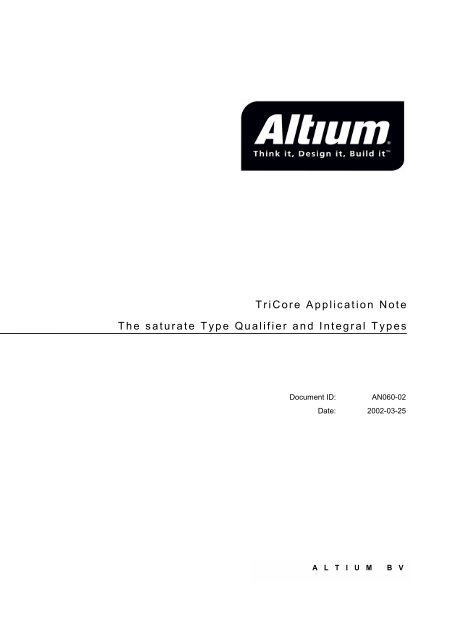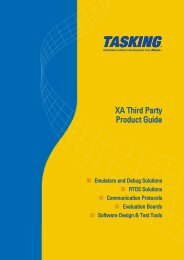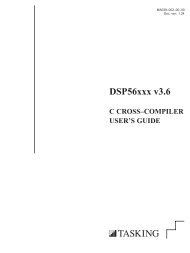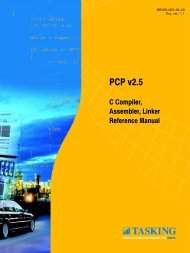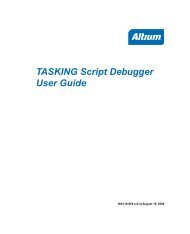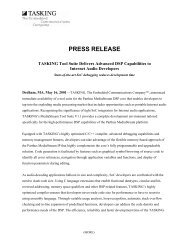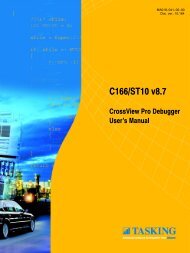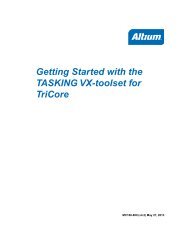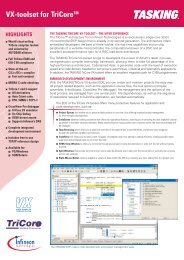TriCore Application Note - Tasking
TriCore Application Note - Tasking
TriCore Application Note - Tasking
- No tags were found...
Create successful ePaper yourself
Turn your PDF publications into a flip-book with our unique Google optimized e-Paper software.
<strong>TriCore</strong> <strong>Application</strong> <strong>Note</strong>The saturate Type Qualifier and Integral TypesDocument ID: AN060-02Date: 2002-03-25A L T I U M B V
<strong>TriCore</strong> <strong>Application</strong> <strong>Note</strong>The saturate Type Qualifier and Integral Types5 CastingCasting between integral types of the same type, causes the bits to be interpreted differently. Next tothis reinterpretation the value may also have influence on operations it is involved in. When casting to alarger integral type the current value is copied into the lower byte(s) of the target value, sign-extend ifthe target is signed, zero-extended if the target is unsigned. When casting to a smaller not saturatedintegral type the lower byte(s) are extracted from the current value and copied in the target value.When casting to a smaller saturated integral type the current value is moved saturated to the the targetvalue, using the specific instructions the Tricore has for this purpose.If you are performing more than one cast on the same value, the casts will be executed from right toleft according to the casting rules as given. The resulting value will have the left most type.When casting from a signed integral type to a saturated smaller unsigned integral type, an implicit castto an unsigned integral type of the larger integral type is first applied. So if you want to apply the cast(_sat unsigned short)i implicitly the following is executed: (_sat unsigned short)(unsigned int)i.When casting from a unsigned integral type to a saturated smaller signed integral type, an implicit castto a signed integral type of the larger integral type is first applied. So if you want to apply the cast(_sat short)ui implicitly the following is executed: (_sat short)(int)ui.Examples:s = -5;us = (unsigned short) s; // us == 65531us = ( _sat unsigned short) s; // us == 65531us = (_sat unsigned int) s; // us == 65531sus = (_sat unsigned short) s; // sus == 65531sus = (_sat unsigned int) s; // sus == 65535suc = s; // suc == 255uc = (_sat) s; // uc == 255uc = (_sat unsigned char)(unsigned char) s; // uc == 251uc = (unsigned char)(_sat unsigned char) s; // uc == 255ui = 0xFFFFFFFF;s = (_sat short)ui; // s = -16 Integral promotionsWhen integral promotions are applied on an operand from a operation, the type of the operand maychange. Saturation is always preserved when applying integral promotions, unsigned however is lost ifthe basic type is either char or short. All values represented by unsigned char and unsigned short arealso represented in signed integer, so the represented value is always preserved when applyingintegral promotions. This results in the following type changes when applying integral promotions:char => intunsigned char => int_sat char => _sat int_sat unsigned char => _sat intshort => intunsigned short => int_sat short => _sat int_sat unsigned short => _sat intint => intunsigned int => unsigned int_sat int => _sat int_sat unsigned int => _sat unsigned intAN060-02 page 4 of 6 2002-03-25
<strong>TriCore</strong> <strong>Application</strong> <strong>Note</strong>The saturate Type Qualifier and Integral Types7 Usual arithmetic conversionsWhen usual arithmetic conversions are applied on the operands of an operation, both operands will beconverted to the same type before executing the operation, which will yield a value of the same type asboth operands have been converted to. After applying integral promotions on each of the operands, thetarget type will be unsigned if one of the operands is unsigned and the target type will be saturated ifone of the operands is saturated.Examples:ui = ui + ci = us + ucsi = sus + ucui = us + uisui = si + ui// left operand is unsigned int, right operand becomes int// operation is performed on, and yields, unsigned int// left operand becomes int, right operand becomes int// operation is performed on, and yields, int// left operand becomes _sat int, right operand becomes int// operation is performed on, and yields, _sat int// left operand becomes int, right operand is unsigned int// operation is performed on, and yields, unsigned int// left operand is _sat int, right operand is unsigned int// operation is performed on, and yields, _sat unsigned int8 ExamplesHere are some a litle bit more complicated examples, with a short explanation.Example 1:s = -5;sus = s; // sui == 65531// there is an implicit cast from short to _sat unsigned// short, due to the assignment, since both types are the// same size only a reinterpretation of the value is done,// no saturation is performedi = -5;sus = i; // sus == 0// this time both types are different, the target being the// smaller type, so saturation is performedExample 2:s = ss + sc; // left and right operand will both become _sat int the add// operation will be performed for saturated 32-bits integers// the result will be cast to a short again (not saturated,// since the left side of the assignement detemines the type)ss = ss + sc; // now the result will be moved saturated, since the left// side is now saturated.AN060-02 page 5 of 6 2002-03-25
<strong>TriCore</strong> <strong>Application</strong> <strong>Note</strong>The saturate Type Qualifier and Integral Types9 Known problems• assigning a too large constant in a static initialisation is truncated instead of saturatedworkaround: e.g. first assign constant to a large enough integer, then assign this value to therequired saturated variable.Example:_sat unsigned short us = 0x12345;Workaround:unsigned int ui = 0x12345;_sat unsigned short us = ui;// this triggers a warning W195, the// value will be truncated, not// saturated// stored using a sat.hu instruction, so// now it is saturated• saturated operation with 2 constants, the compiler performs the operation unsaturated.workaround: switch off the constant/copy propagation optimization for the function this occurs in.Example:int test ( void ){_sat int si_1 = 0x0FFFFFFF;_sat int si_2 = 0x7FFFFFFF;return ( si_1 + si_2 ); // calculation done buildtime, unsaturated !}Workaround:#pragma optimize Pint test ( void ){_sat int si_1 = 0x0FFFFFFF;_sat int si_2 = 0x7FFFFFFF;return ( si_1 + si_2 ); // calculation done runtime, saturated}#pragma optimize restoreAN060-02 page 6 of 6 2002-03-25


